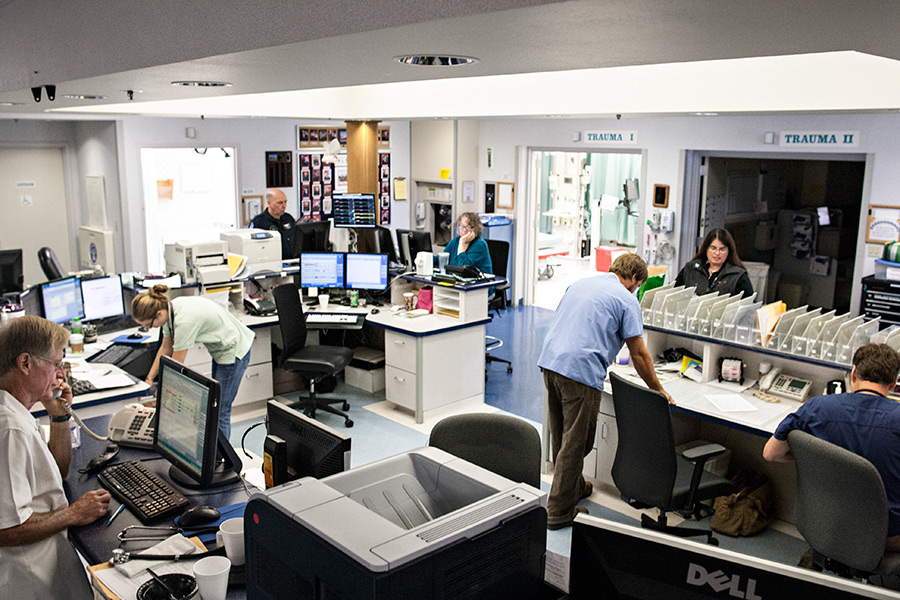Despite an outpouring of support for Gov. Steve Bullock’s proposal to expand Medicaid coverage to up to 70,000 poor Montanans, Republicans on a House committee voted March 6 to kill the so-called Healthy Montana Plan.
House Democrats bristled at the late-night, party-line vote by the House Human Services Committee, which came after a six-and-a-half hour hearing on the governor’s proposal, during which some 250 supporters packed the Capitol building to testify in favor of House Bill 249. About 12 people testified in opposition to the measure.
The panel voted 10-7 to send HB 249 to the House floor with a “do not pass” recommendation, a motion that requires a supermajority vote, or three-fifths of the House, to overturn and allow the full House to consider the bill.
Because Republicans hold a 59-41 House majority, a minimum of 19 GOP lawmakers would have to join the full slate of 41 Democrats to advance the bill further – an improbable outcome given the caucuses’ sharp divisions over Medicaid expansion.
The committee vote prompted charges of “political shenanigans” by Democrats on the panel, including Rep. Ellie Hill, D-Missoula, who accused the short list of opponents of parroting talking points from out-of-state interest groups, as well as objections to the motion on the grounds that it violated the state constitution by requiring a super-majority vote.
Bullock’s office released a statement expressing its disappointment in the committee vote, saying that the voices of Montanans outweighed the opposition tactics by groups like Americans for Prosperity Montana, a political network backed by the Koch brothers, which launched television and radio ads opposing expansion while targeting Republican lawmakers they say are considering voting in favor of the expansion bill.
“Today’s vote told Montanans that their elected members of the Legislature value the voices of out-of-state dark money groups over the voices of the thousands of Montanans who spoke out in favor of the Healthy Montana Plan,” Bullock stated on March 6. “I am not done working on this and my door remains open to legislators willing to find real solutions for the 70,000 Montanans that are counting on them.”
Supporters of the expansion measure included physicians, hospital executives, business owners, veterans, tribal officials and citizens who traveled from across the state to urge committee members to set aside political ideology and approve the bill.
Kalispell resident Kelly Blouch testified in favor of accepting federal dollars to extend Medicaid to low-income Montanans, saying she fell into a coverage gap after losing her job and health insurance in September. Having been diagnosed with a chronic lung disorder that attacked her kidneys and liver, Blouch lost her place on a waiting list for a kidney transplant after losing her coverage.
Dr. John Tremper, a Kalispell physician, told committee members that Blouch’s story is not uncommon, and that he treats patients every day who fall into a widening coverage gap.
“I see these patients all day and it’s more than just slipping through the cracks,” Tremper said. “There are major fissures in the health care system. And they all feel trapped. It could be your granddaughter if the laws don’t change. It could be you. I’m here to tell you how these people are trying to get care and how they are trapped and how hard it is to take care of them.”
Numerous tribal officials also testified in favor of the Medicaid expansion measure, including Harry Barnes, chairman of the Blackfeet Tribal Business Council in Browning, who said it’s a myth that Native Americans receive free health care. Barnes said health care funding through Indian Health Services is woefully inadequate and is not prepared to meet the needs of uninsured tribal members.
“Expansion of a health care delivery system is vital not just to Native Americans, but to all Montana citizens,” Barnes said. “This bill is about improving the health and hope in Montana. This bill is about providing a lifeline to rural health care providers struggling to keep their doors open.”
The Republican-led Legislature rejected expansion in 2013 and this year cited concerns about covering people that are “able-bodied” and sticking the state with the costs if federal money dries up.
Republican lawmakers have proposed their own plan, House Bill 455, that would cover 10,000 people, including some veterans and low-income parents, plus about 800 disabled people who qualify for services but are on long waiting lists to get care. The measure would cost the state more than $20 million annually. That bill is advancing in the House.
HB 249, by contrast, covers an estimated 70,000 Montanans – people earning 138 percent or less of the federal poverty level, who would qualify to receive Medicaid. Adults making up to $16,105 per year and a family of four earning up to $32,913 would qualify under the bill.
Over the next four years, the expansion would be funded solely by the federal government and save the state $80 million. Beginning in 2020, the then $500-million annual expansion would be funded 90 percent by the federal government and 10 percent by the state.
Rep. Nancy Ballance, R-Hamilton, sponsored the GOP-backed health care bill, called the Big Sky Health Plan. She testified that Bullock’s plan would create an “entitlement class of able-bodied adults.”
“The end result would be coverage to tens of thousands of able-bodied adults who would in effect crowd out the people for whom Medicaid was designed, like veterans and the disabled,” she said. “In my opinion there are better solutions.”
